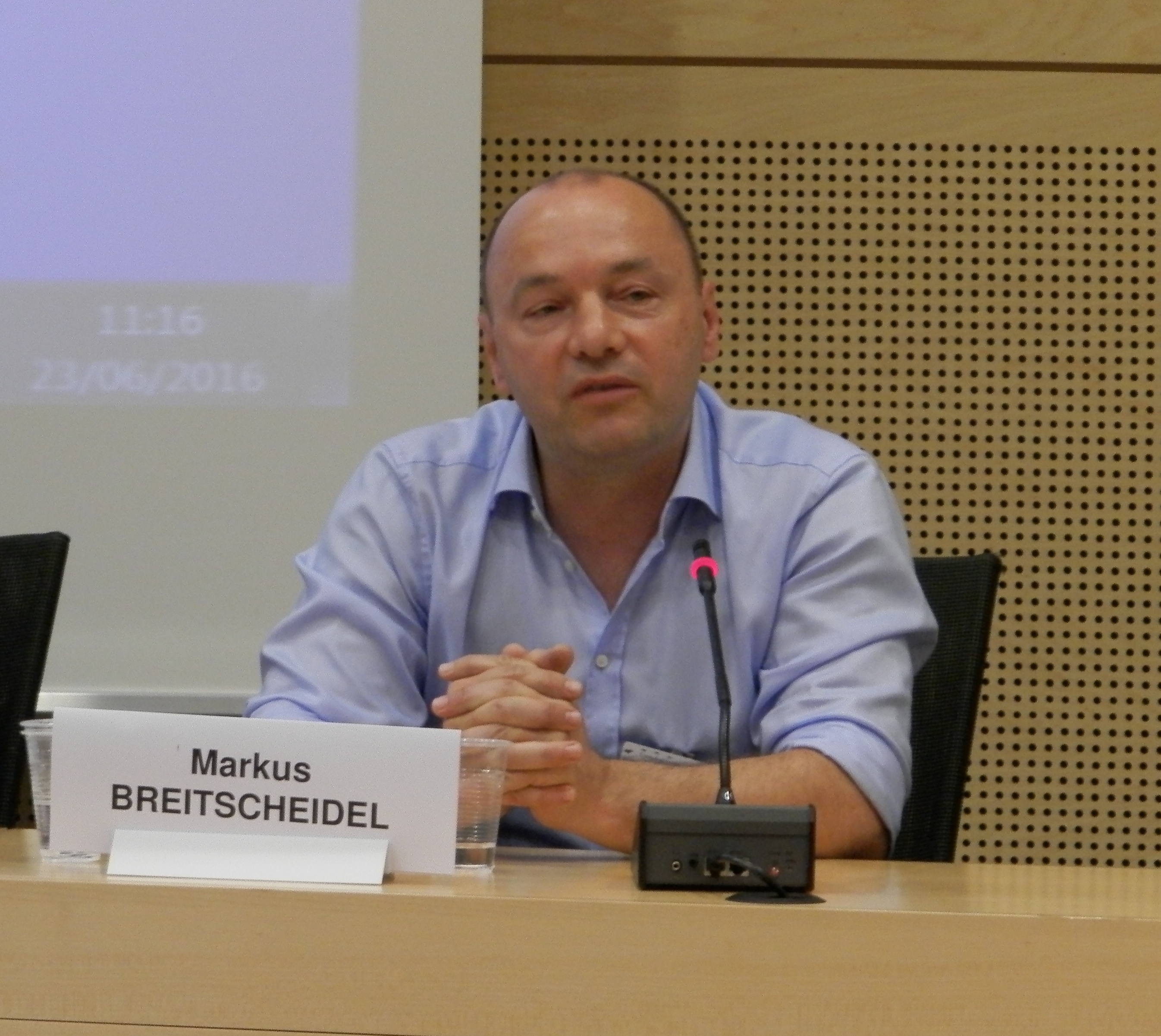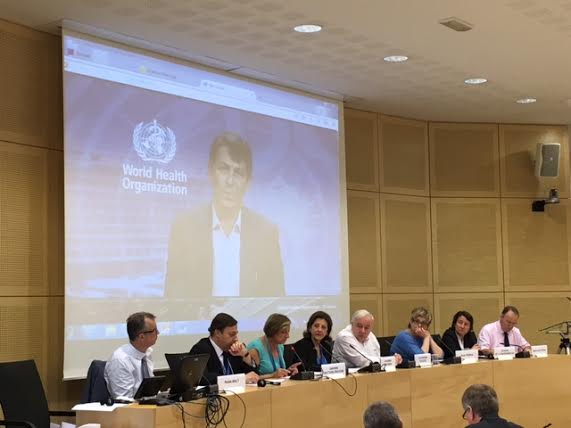Ageing and Health:
A challenge to public health and social cohesion
Council of Europe, Strasbourg, June 23 2016

In 2000, investigative journalist and writer Markus Breitscheidel decided to scrutinize the way nursing homes in Germany look after their residents and their employees. Unlike news journalists, Markus Breitscheidel focuses on a single topic over three years and self-funds all his research for total independence.
Recruitment without training
« On Monday, I went to the job centre in Munich to look for my first job. Two hours later I got a call for my first interview. The following day, I started as carer in charge of 12 heavily dependent residents without any training whatsoever in this field, coming from the world of business and journalism into this.”
Strict task timing leading to personnel burnout and elder abuse, an industrial business model totally unsuited to caring for and sharing with human beings
“I never thought”, said Markus, “that Fordism, which I studied at college – i.e. a set time allocated to each task – would be used in the care sector. Yet this is exactly how people work: I have one minute to give a glass of water to an old man or an old lady. I have a minute and a half to take a person to the toilet, clean them and put them back in their wheelchair or their bed. “
Markus reminds us that, in Henry Ford’s era, this system already created relationship problems between men and machines. The car workers suffered en masse from burnout and became aggressive with the machines. “This has been adapted step by step to the care sector”, deplores Markus “and it is not surprising that in a man to man relationship, this also leads to high numbers of burnout cases or to violence.
Speaking from personal experience, I can tell you that time devoted to care cannot be programmed. A lady I was looking after could, with my help when she was feeling well, go to the toilet in a minute or a minute and a half, but the following day, if she was not feeling well, she was less mobile and I needed three minutes. Spending this extra time with her meant spending less time with the next person.”
Constantly running after time drives staff mad
“No wonder carers, changed into robots, cannot hold their job for more than 5 years and that, recruiting people to work in such conditions – whether in hospitals or nursing homes – is extremely difficult in Europe. In such working conditions, no human being, wishing to look after people, can do it without breaking down at some point.
I am sure that each country has a certain number of people able and willing to work in health and care, but thanks to this system, they have been put off. They have been turned into care robots, who have to obey the system and obey their bosses’ orders.”
Investors regard it as a profit making sector
From his two-year experience in five different areas in Germany, Markus Breitscheidel concludes that the care sector is a major economic issue. And, says Markus, because of the growing demand, this is where the biggest investments will be made. With expected profits of 10 to 15%, Markus Breitscheidel tried to identify profitability elements in a country like Germany, where care needs can be classified into 5 groups and where the higher the need for care, the more time and most of all, the more money you need.
“Adverse effects linked to patient’s health”
From a strictly economic point of view according to Markus Breitscheidel, this means that the more dependent a patient is, the more money they can make for the nursing home. It is hardly surprising then, as far as he is concerned, that improving patients’ health is not a priority.
"When I saw this, he said, I decided to try, after my working hours, to give some of my time to one or two residents in my care. I did this for two or three days before being summoned to see the management because what I was doing had been noticed. Later, they threatened to sack me because improving patients’ health was not profitable: if they got better, they would go down to the lower health care bracket (where they needed less care) and the nursing home would get less money."
What improvements can we recommend?
because I see that, in Germany, those who sit on the board of directors of the big public corporations, including health and care companies, are often people who held or still hold political office. There is a lot of lobbying work to be done to change things and prepare a better future. In Brussels, the professional care unions spend a lot of money to lobby massively. They besiege every single influential politician to stop those who try to interfere with the future of their activity. I would like to say that I feel personally involved in my future needs for care that will be dispensed by business men. I would like, later in life, to be free until the end, and for this reason, I am starting my fight now and I hope to be strong enough in the next twenty years to see my propositions accepted."
Recruitment without training
« On Monday, I went to the job centre in Munich to look for my first job. Two hours later I got a call for my first interview. The following day, I started as carer in charge of 12 heavily dependent residents without any training whatsoever in this field, coming from the world of business and journalism into this.”
Strict task timing leading to personnel burnout and elder abuse, an industrial business model totally unsuited to caring for and sharing with human beings
“I never thought”, said Markus, “that Fordism, which I studied at college – i.e. a set time allocated to each task – would be used in the care sector. Yet this is exactly how people work: I have one minute to give a glass of water to an old man or an old lady. I have a minute and a half to take a person to the toilet, clean them and put them back in their wheelchair or their bed. “
Markus reminds us that, in Henry Ford’s era, this system already created relationship problems between men and machines. The car workers suffered en masse from burnout and became aggressive with the machines. “This has been adapted step by step to the care sector”, deplores Markus “and it is not surprising that in a man to man relationship, this also leads to high numbers of burnout cases or to violence.
Speaking from personal experience, I can tell you that time devoted to care cannot be programmed. A lady I was looking after could, with my help when she was feeling well, go to the toilet in a minute or a minute and a half, but the following day, if she was not feeling well, she was less mobile and I needed three minutes. Spending this extra time with her meant spending less time with the next person.”
Constantly running after time drives staff mad
“No wonder carers, changed into robots, cannot hold their job for more than 5 years and that, recruiting people to work in such conditions – whether in hospitals or nursing homes – is extremely difficult in Europe. In such working conditions, no human being, wishing to look after people, can do it without breaking down at some point.
I am sure that each country has a certain number of people able and willing to work in health and care, but thanks to this system, they have been put off. They have been turned into care robots, who have to obey the system and obey their bosses’ orders.”
Investors regard it as a profit making sector
From his two-year experience in five different areas in Germany, Markus Breitscheidel concludes that the care sector is a major economic issue. And, says Markus, because of the growing demand, this is where the biggest investments will be made. With expected profits of 10 to 15%, Markus Breitscheidel tried to identify profitability elements in a country like Germany, where care needs can be classified into 5 groups and where the higher the need for care, the more time and most of all, the more money you need.
“Adverse effects linked to patient’s health”
From a strictly economic point of view according to Markus Breitscheidel, this means that the more dependent a patient is, the more money they can make for the nursing home. It is hardly surprising then, as far as he is concerned, that improving patients’ health is not a priority.
"When I saw this, he said, I decided to try, after my working hours, to give some of my time to one or two residents in my care. I did this for two or three days before being summoned to see the management because what I was doing had been noticed. Later, they threatened to sack me because improving patients’ health was not profitable: if they got better, they would go down to the lower health care bracket (where they needed less care) and the nursing home would get less money."
What improvements can we recommend?
- A high priority need: improve staff work conditions
- Avoid speculation
Secondly, we need to think about a democratic way to finance this sector in the next 20 years, because I am convinced that we cannot allow commercial companies to carry on making money on people’s back. It does not work. We must make sure that every euro invested in care goes to the care personnel or to building a future for this sector. - A voluntary credit
- Regarding his book:
- over 85 000 copies sold in two weeks
After a year and a half of rejections from various publishers claiming that the subject matter would not interest anyone, Markus Breitscheidel said that he finally found a publisher brave enough to publish his book. Eighty-five thousand copies sold within a fortnight, making it the number one bestseller book in Germany. - Political pressure and over a hundred court cases won
"I wanted to talk about this subject in public but politicians were not happy about it. I noticed that I attracted attention whenever I was invited on television. But I was subjected to increasing pressure regarding these television programs, to the point that a government representative would contact me before each of my TV appearances. He would tell me what I could say and what I couldn’t. And if he thought I was taking too much liberty, he would take me to court. They took me to court over a hundred times and I won every time. - My top priority is to propose ways to improve this sector for the future.
because I see that, in Germany, those who sit on the board of directors of the big public corporations, including health and care companies, are often people who held or still hold political office. There is a lot of lobbying work to be done to change things and prepare a better future. In Brussels, the professional care unions spend a lot of money to lobby massively. They besiege every single influential politician to stop those who try to interfere with the future of their activity. I would like to say that I feel personally involved in my future needs for care that will be dispensed by business men. I would like, later in life, to be free until the end, and for this reason, I am starting my fight now and I hope to be strong enough in the next twenty years to see my propositions accepted."








 RSS Feed
RSS Feed